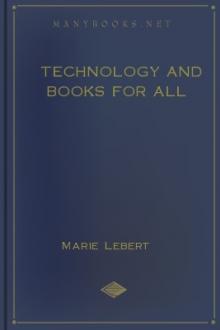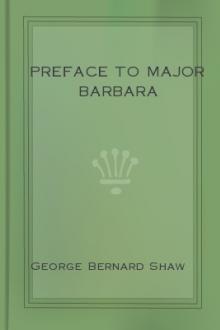Moral Principles in Education, John Dewey [best romantic books to read TXT] 📗

- Author: John Dewey
- Performer: -
Book online «Moral Principles in Education, John Dewey [best romantic books to read TXT] 📗». Author John Dewey
What we need in education is a genuine faith in the existence of moral principles which are capable of effective application. We believe, so far as the mass of children are concerned, that if we keep at them long enough we can teach reading and writing and figuring. We are practically, even if unconsciously, skeptical as to the possibility of anything like the same assurance in morals. We believe in moral laws and rules, to be sure, but they are in the air. They are something set off by themselves. They are so very “moral” that they have no working contact with the average affairs of every-day life. These moral principles need to be brought down to the ground through their statement in social and in psychological terms. We need to see that moral principles are not arbitrary, that they are not “transcendental”; that the term “moral” does not designate a special region or portion of life. We need to translate the moral into the conditions and forces of our community life, and into the impulses and habits of the individual.
All the rest is mint, anise, and cummin. The one thing needful is that we recognize that moral principles are real in the same sense in which other forces are real; that they are inherent in community life, and in the working structure of the individual. If we can secure a genuine faith in this fact, we shall have secured the condition which alone is necessary to get from our educational system all the effectiveness there is in it. The teacher who operates in this faith will find every subject, every method of instruction, every incident of school life pregnant with moral possibility.
Contents
THE MORAL PURPOSE OF THE SCHOOL Moral ideas and ideas about morality 1 Moral education and direct moral instruction 3 THE MORAL TRAINING GIVEN BY THE SCHOOL COMMUNITY The unity of social ethics and school ethics 7 A narrow and formal training for citizenship 8 School life should train for many social relations 9 It should train for self-direction and leadership 10 There is no harmonious development of powers apart from social situations 11 School activities should be typical of social life 13 Moral training in the schools tends to be pathological and formal 15 THE MORAL TRAINING FROM METHODS OF INSTRUCTION Active social service as opposed to passive individual absorption 21 The positive inculcation of individualistic motives and standards 23 The evils of competition for external standing 24 The moral waste of remote success as an end 25 The worth of active and social modes of learning 26 THE SOCIAL NATURE OF THE COURSE OF STUDY The nature of the course of study influences the conduct of the school 31 School studies as means of realizing social situations 31 School subjects are merely phases of a unified social life 32 The meaning of subjects is controlled by social considerations 33 Geography deals with the scenes of social interaction 33 Its various forms represent increasing stages of abstraction 34 History is a means for interpreting existing social relations 36 It presents type phases of social development 37 It offers contrasts, and consequently perspective 37 It teaches the methods of social progress 38 The failure of certain methods of teaching history 39 Mathematics is a means to social ends 40 The sociological nature of business arithmetic 41 Summary: The moral trinity of the school 42 THE PSYCHOLOGICAL ASPECT OF MORAL EDUCATION Conduct as a mode of individual performance 47 Native instincts and impulses are the sources of conduct 47 Moral ideals must be realized in persons 48 Character as a system of working forces 49 Force as a necessary constituent of character 49 The importance of intellectual judgment or good sense 50 The capacity for delicate emotional responsiveness 52 Summary: The ethical standards for testing the school 53 Conclusion: The practicality of moral principles 57HOUGHTON MIFFLIN COMPANY
End of Project Gutenberg's Moral Principles in Education, by John Dewey
*** END OF THIS PROJECT GUTENBERG EBOOK MORAL PRINCIPLES IN EDUCATION ***
***** This file should be named 25172-h.htm or 25172-h.zip *****
This and all associated files of various formats will be found in:
http://www.gutenberg.org/2/5/1/7/25172/
Produced by Barbara Tozier, Bill Tozier and the Online
Distributed Proofreading Team at http://www.pgdp.net
Updated editions will replace the previous one--the old editions
will be renamed.
Creating the works from public domain print editions means that no
one owns a United States copyright in these works, so the Foundation
(and you!) can copy and distribute it in the United States without
permission and without paying copyright royalties. Special rules,
set forth in the General Terms of Use part of this license, apply to
copying and distributing Project Gutenberg-tm electronic works to
protect the PROJECT GUTENBERG-tm concept and trademark. Project
Gutenberg is a registered trademark, and may not be used if you
charge for the eBooks, unless you receive specific permission. If you
do not charge anything for copies of this eBook, complying with the
rules is very easy. You may use this eBook for nearly any purpose
such as creation of derivative works, reports, performances and
research. They may be modified and printed and given away--you may do
practically ANYTHING with public domain eBooks. Redistribution is
subject to the trademark license, especially commercial
redistribution.
*** START: FULL LICENSE ***
THE FULL PROJECT GUTENBERG LICENSE
PLEASE READ THIS BEFORE YOU DISTRIBUTE OR USE THIS WORK
To protect the Project Gutenberg-tm mission of promoting the free
distribution of electronic works, by using or distributing this work
(or any other work associated in any way with the phrase "Project
Gutenberg"), you agree to comply with all the terms of the Full Project
Gutenberg-tm License (available with this file or online at
http://gutenberg.net/license).
Section 1. General Terms of Use and Redistributing Project Gutenberg-tm
electronic works
1.A. By reading or using any part of this Project Gutenberg-tm
electronic work, you indicate that you have read, understand, agree to
and accept all the terms of this license and intellectual property
(trademark/copyright) agreement. If you do not agree to abide by all
the terms of this agreement, you must cease using and return or destroy
all copies of Project Gutenberg-tm electronic works in your possession.
If you paid a fee for obtaining a copy of or access to a Project
Gutenberg-tm electronic work and you do not agree to be bound by the
terms of this agreement, you may obtain a refund from the person or
entity to whom you paid the fee as set forth in paragraph 1.E.8.
1.B. "Project Gutenberg" is a registered trademark. It may only be
used on or associated in any way with an electronic work by people who
agree to be bound by the terms of this agreement. There are a few
things that you can do with most Project Gutenberg-tm electronic works
even without complying with the full terms of this agreement. See
paragraph 1.C below. There are a lot of things you can do with Project
Gutenberg-tm electronic works if you follow the terms of this agreement
and help preserve free future access to Project Gutenberg-tm electronic
works. See paragraph 1.E below.
1.C. The Project Gutenberg Literary Archive Foundation ("the Foundation"
or PGLAF), owns a compilation copyright in the collection of Project
Gutenberg-tm electronic works. Nearly all the individual works in the
collection are in the public domain in the United States. If an
individual work is in the public domain in the United States and you are
located in the United States, we do not claim a right to prevent you from
copying, distributing, performing, displaying or creating derivative
works based on the work as long as all references to Project Gutenberg
are removed. Of course, we hope that you will support the Project
Gutenberg-tm mission of promoting free access to electronic works by
freely sharing Project Gutenberg-tm works in compliance with the terms of
this agreement for keeping the Project Gutenberg-tm name associated with
the work. You can easily comply with the terms of this agreement by
keeping this work in the same format with its attached full Project
Gutenberg-tm License when you share it without charge with others.
1.D. The copyright laws of the place where you are located also govern
what you can do with this work. Copyright laws in most countries are in
a constant state of change. If you are outside the United States, check
the laws of your country in addition to the terms of this agreement
before downloading, copying, displaying, performing, distributing or
creating derivative works based on this work or any other Project
Gutenberg-tm work. The Foundation





Comments (0)